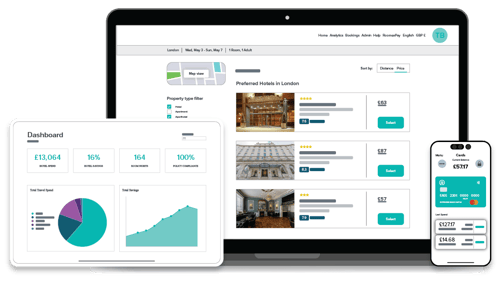Every company, large or small, should have a clearly defined set of policies on business travel and for many reasons including efficiency, cost control, employee safety and comfort. If you don’t already have one, I recommend that you create one (you can download a template). Get it agreed with the relevant people in your organisation, post it on your intranet, and communicate its existence.
However, it is one thing to have policies, quite another to get people to comply with them. Even the largest multinational corporations have trouble in this regard. According to an August 2015 survey of more than 350 corporate travel managers and buyers by the Association of Corporate Travel Executives (ACTE), 72% of travel managers had not achieved their desired travel policy compliance level. But it’s even harder for small and medium sized enterprises to ensure compliance with travel policies, since they do not usually have dedicated internal resources or travel management companies to help them. In many SMEs hotel bookings are handled by PAs and office support staff with a thousand other things to worry about.
Online travel agents (OTAs) have contributed massively to non-compliance. Business travellers often think they are doing the hard-pressed office assistant a favour by self-serving. “Don’t worry, I’ll just book it myself on booking.com”. What they don’t realise is that they are only causing further admin effort further down the line (for example the need to reconcile personal credit card payments, file expense claims etc.). They may also be in breach of travel policy, for example by failing to choose a preferred hotel, or by booking a preferred hotel for a price that is above your privately negotiated rate. Or they are choosing a hotel that is unsuitable for their business purposes: it is obviously not a good idea to turn up at a hotel with a company vehicle full of expensive equipment, only to find out that the hotel does not have secure parking facilities.
In short, when employees self-serve with leisure travel-oriented online booking platforms, what seems to be a “good deal” is often anything but, and their good intentions to save you time could cause a major headache.
Less well-intentioned are those business travellers who flout company T&E policies by booking directly with hotels in order to collect loyalty points with a particular hotel chain. “Preferred guest” and “rewards” programmes are intended to alter buying decisions, but this rarely works to your company’s advantage: the rewards are for the individual traveller while your company is probably losing out on the best rates.
Action you can take
Before we get into what you should do, let’s deal with what you should not do. Mass emails simply do not work and may even be counter-productive. And that is true regardless of the sender, from secretary to CEO, and regardless of tone, from “gentle reminder” to “company directive”. The reason is simple, mass emails deal with generalities and individuals are always “special cases”. Those who are complying will resent it, and those who aren’t will look for reasons why “this does not apply to me”. Naming and shaming repeat offenders is also a bad idea: it only creates bad feeling.
On the other hand, most employees want to be good corporate citizens.
Use this as the basis for winning people around. The carrot is always better than the stick. Hotel bookers, whether they are travel managers, PAs or procurement officers might like to try the following strategies before escalating things. Invite the business travellers concerned and explain the situation.
For the self-server: First, state that you appreciate that they are trying to help, then demonstrate why they are actually adding to your administrative workload. Outline the most relevant reasons for having a travel policy, which is to ensure maximum comfort for employees by selecting the best hotels.
For the loyalty card holder: First, state that you have no problem with them collecting loyalty points so long as this coincides with your policies. Then explain the risks of hotel booking outside the travel policy. These include cost management, of course, but also avoiding a situation where employees feel they are not being treated fairly and equally.
In all events, you need to explain the concept of duty of care: your company’s obligations to protect employees from harm while travelling. The world has become a more dangerous place recently, so this argument will strike a chord. But there are less obvious risks than international terrorism and natural disasters: for example, every time a business traveller uses a credit card there is a risk of identity theft and fraud. Much better if this is handled centrally. On a more positive note, you should also state that you are interested in feedback about employee satisfaction levels with hotels, and commit to reviewing preferred hotels on an annual basis.
How Roomex helps
If you make it your company policy to book all hotels through Roomex, everyone benefits. As the person responsible for managing company travel. you benefit enormously as a result of faster booking and payment processes. Of course, there may be some cases where there is a good reason to make an exception (or you have no choice) but with Roomex you can keep an eye on these – that will help you improve the overall rate of compliance and explain to senior managers (if asked) the reasons for any deviations from policy. According to a 2013 report by the Aberdeen Group, implementing an end-to-end solution such as Roomex results on average in a 44% increase in compliance.
For the business traveller, it means fewer things to worry about: no need to spend time finding a hotel, faster check-in and check-out, and support if anything goes wrong. For those who take a little more convincing, seeing is believing. Use Roomex to demonstrate how it always finds the most appropriate hotels for any business trip (e.g. based on location and facilities), at the best price, and within company policies and guidelines.
Therefore, while travellers might think that they are getting a better deal booking for themselves, you can show very clearly that they aren’t.
You might also want to demonstrate the savings that you make by booking through Roomex. The reporting dashboards not only show aggregated spend and savings, but also savings by any criteria you choose, including project, department, cost code and by individual business traveller. Many companies where business travel is an important spend category consider compliance with travel policies, and the savings that result, in annual staff reviews.
Now that really is a pretty big carrot!
Tags:
Workforce Travel
December 19, 2017

